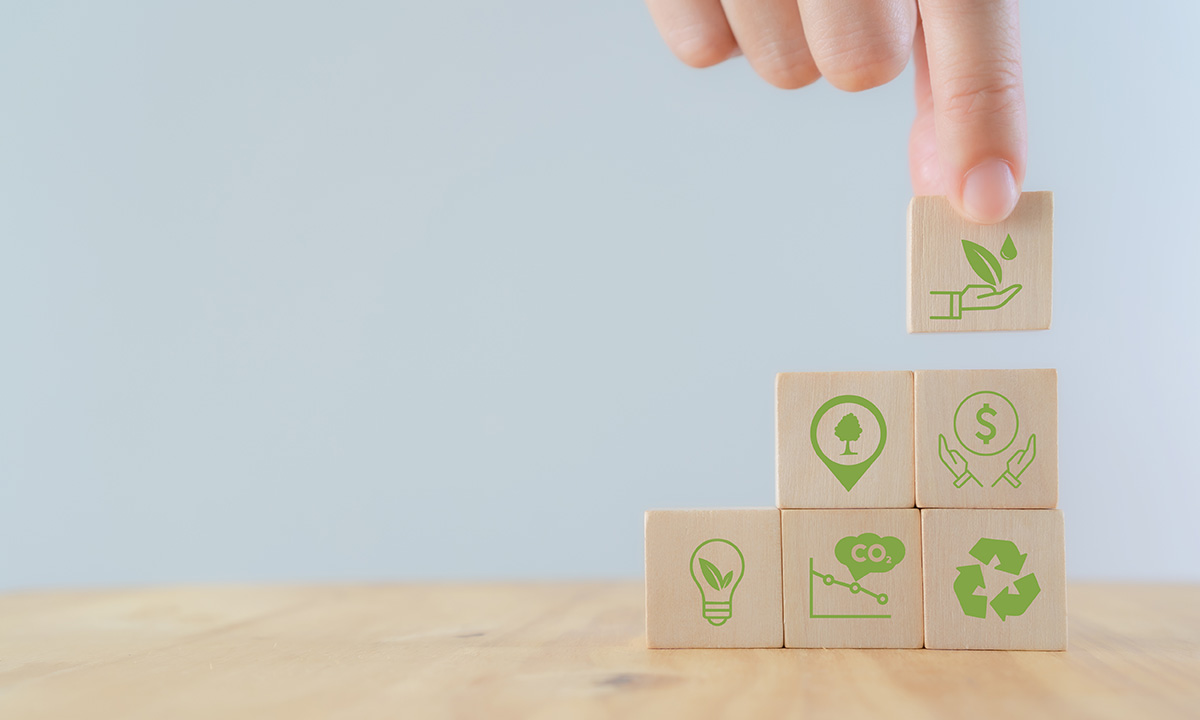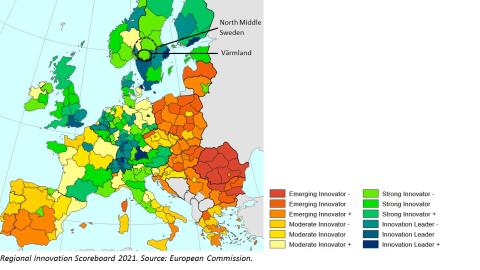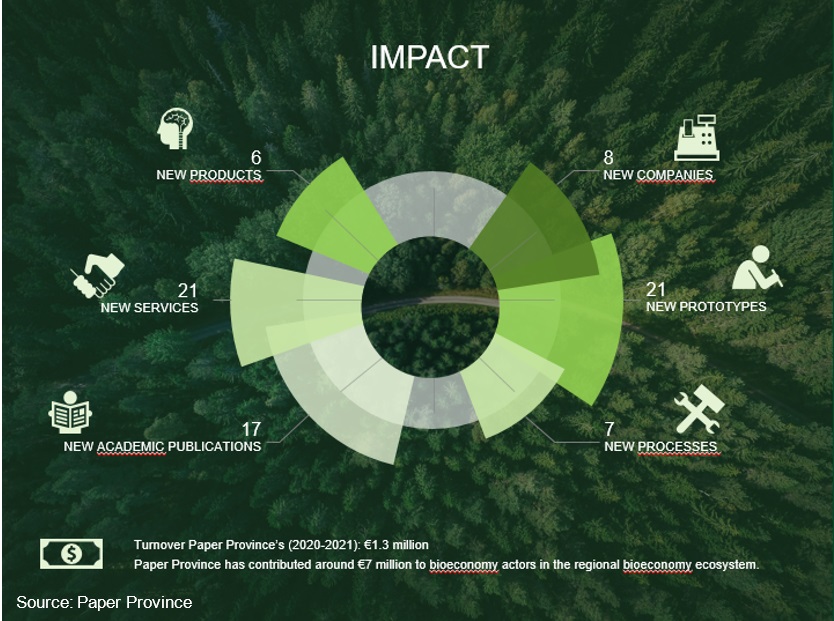Industrial transition in Värmland's forest-based bio-economy
Summary: Region Värmland, together with the cluster initiative Paper Province, has established itself as a leading region in the forest-based bioeconomy. In the early 2000s, Paper Province started with services tailored to the needs of the pulp and paper industry, but decided to work towards a holistic industrial ecosystem for forest-based industries. Since 2013, the cluster management has been working towards building an effective innovation hub with participation of industry and science, an incubator, testbeds and other intermediaries. The cluster benefits from strong support for cluster-based economic development by the region and targeted support programmes by the region for industrial transition. Close collaboration among Värmland’s regional cluster initiatives facilitates green and digital transition and overcoming specific industry challenges. All regional clusters have played an essential role in drafting both the regional development and smart specialisation strategy, which aim to lead to a more sustainable and resilient economy in the region.
The Värmland Region
 Parradee-Kietsirikul/AdobeStock
Parradee-Kietsirikul/AdobeStock
The province of Värmlands Län is located in the southwestern part of central Sweden and stretches along the Norwegian-Swedish border and the foothills of the Skanden. With a land area of about 17,500 square kilometers, Värmlands Län is the eighth largest province in Sweden. It counts about 283,000 inhabitants and an average population density of 16 inhabitants per square kilometer, which is well below the Swedish average. More than half of the inhabitants are concentrated in the municipalities directly bordering Lake Vänern, while the municipality of Torsby, which is the northernmost and by far the largest municipality in the province, has a population density of less than 3 inhabitants per square kilometer. Värmland (NUTS 3) forms the southern part of the Norra Mellansverige (North Middle Sweden) (NUTS 2) region. According to the EU’s Regional Innovation Scoreboard 2021, North Middle Sweden has been assessed as a strong Innovator with an increasing innovation performance (15,5%) during the last years.

INDUSTRIAL ECOSYSTEMS
Three Industrial Ecosystems dominate the economy of Värmland. Traditionally they are driven by SMEs and large companies who work closely with Karlstad University, as a key regional R&D player. The three ecosystems are:
1. Forest-based bio-economy
2. Steel & manufacturing industry
3. ICT and digital health care
STRATEGIC CHALLENGES
The regional development strategy "Värmlandsstrategin 2040" describes three key challenges for the future development of a resilient region:
(a) Demography and exclusion,
(b) Skills supply and matching issues,
(c) Climate change and external influences.
These challenges relate to the social, environmental and economic development of the region and encompass all strategic actions and objectives.
CLUSTER POLICY AND CLUSTERS
Region Värmland addresses the regional socio-economic challenges with an overarching development strategy, “Värmlandstrategin 2040”, which sets out a holistic vision for the region up to 2040: “A sustainable Värmland that makes a global difference”. For an in-depth operational shaping of the vision for Värmland, application-oriented sub-strategies have been developed, setting targets for concrete areas of action and shorter time horizons. The strategy builds on the “Research and Innovation Strategy for Sustainable Smart Specialisation 2022-2028”, which prominently features clusters and industrial ecosystems. Värmland does not see smart specialisation as a purely economic strategy, but as a framework in which different branches/actors interact to strengthen the areas of specialisation and work together on a green and resilient future. Cluster development, which began in the early 2000s, has given direction to the work and resulted in many concrete measures that have contributed to the strengthening of priority areas, an improved innovation climate in Värmland and the strengthening of the region's international competitiveness.
There are seven clusters operating in Värmland, working in the forest-based bio-economy, in steel & machinery, in the food industry, on digital systems, on photovoltaics, on gamification and tourism. All cluster organisations are co-financed by Region Värmland to a small extent. The region is also represented on the board of all cluster organisations, which highlights the close link between the objectives of regional development and cluster management. In addition, all cluster organisations have been decisively involved in the conception and formulation of the “Research and Innovation Strategy for Sustainable Smart Specialization 2022-2028”. They also have a role to be an open platform for co-operation for all of the smart S3 priority areas.
THE FOREST-BASED BIO-ECONOMY ECOSYSTEM
Value added in Värmland is traditionally generated in forestry, the steel industry and manufacturing. Pulp and paper production in particular stands out due to a high degree of specialisation and expertise. Approximately 200 companies along the entire value chain with about 12,000 workers build the pulp and paper industry in Värmland, some of which are among the world leaders within the industry. The value chain ranges from companies operating forest, paper and pulp mills to all major national and international machinery and equipment suppliers, technology and engineering companies and other specialised service companies. Some of these companies are subsidiaries of globally active large corporations, while others are local SMEs. Nevertheless, these companies are also active in the global market, or they provide their services to local global players, which in turn entangles them in the global value network.
To facilitate industrial transition, the regional forest-based bio-economy is shaped by a small number of cooperating intermediaries, above all the cluster initiative Paper Province. Other relevant actors are Sting Bioeconomy, which provides business development support for bio-economy Start-Ups, Karlstad University for advanced education and research in bio-economy and skills development, as well as RISE and other operators of several testbeds in the region. All of these actors are committed to working towards the transition to a green future through the use of forest biomass instead of fossil materials, for example in the production of textiles, packaging and bioplastics. This focus has been addressed by intensifying research, innovation, and technological developments for processing, opening new niches in forestry entrepreneurship, and developing new business opportunities in existing and new companies.
Further reading:
Ida Andersson, Ida Grundel “Regional policy mobilities: Shaping and reshaping bio-economy policies in Värmland and Västerbotten, Sweden”: https://www.sciencedirect.com/science/article/pii/S0016718521000488
Nelli Mikkola, Linda Randall and Annika Hagberg (eds.) “GREEN GROWTH IN NORDIC REGIONS”: http://norden.diva-portal.org/smash/record.jsf?pid=diva2%3A957463&dswid=9161
Paper Province
 piranka/AdobeStock
piranka/AdobeStock
The cluster initiative Paper Province was founded in 1999 with the aim of strengthening regional economic resilience by increasing the supply of skilled workers in the pulp and paper industry. Accordingly, the activities in the early stages of the cluster focused on knowledge transfer and skill development for companies in the region. Today, the cluster has expanded its strategic focus and its service portfolio in order to better address the needs for a green industrial transition in the forest industry.
MAIN FEATURES
The cluster initiative counts 130 paying members from the forest-based industry, mainly located in Värmland. Only about 10 members are located in other parts of Sweden. Beside the paying membership there is the possibility of a so-called committed partnership, which is common for intermediaries in the sector and region (about 40 committed partners). Important committed partners are the Karlstad University, the Region Värmland, the Innovation Park Karlstad as well as other accelerators and investors, so that all sections of a Triple Helix structure are covered.
The cluster initiative predominantly finances its work through project funding, currently managing twelve innovation projects. In addition, the cluster receives financial support from the region. The smallest amount of the financing is covered by membership fees. A major revenue source is the ten-year Vinnväxt programme by the Swedish innovation agency Vinnova. The aim of the programme is to promote a green industrial transition by developing internationally competitive research and innovation environments in specific growth fields. Paper Province used the public funding for research, development and commercialisation of new forest industry products and services, and to increase the efficiency of the basic regional industry.
Every three years, Paper Province elaborates a new, revised strategy for cluster development. The current strategy was established in 2020 and rests on a foresight study “Transition to the bio-economy – a Foresight on the drivers of the bio-economy for Paper Province” which analyses the needs and activities of the member companies. The main vision of the strategy is to make Paper Province the “leading core of expertise in the forest-based bio-economy”. The cluster strategy is closely linked to Värmland’s Smart Specialisation Strategy as well as other relevant industry and sustainable development strategies, such as the Agenda 2030 of the UN. Demonstrating its high level of management excellence, Paper Province carries the Gold Label from the European Cluster Excellence Initiative.
SERVICE PORTFOLIO
Innovation and Development is one of four core actions for Paper Province. On the one hand, innovation promotion takes place on a broad scale, but on the other, Paper Province specialises in four research areas in which the cluster aims to become an international leader: (a) fossil free coating, (b) development of bio-composites for additive manufacturing (3D printing), (c) lignin as a forest based product, (d) industrial wood construction. All innovation topics are connected to research areas of the Karlstad University.
The second core action is the supply of skilled work force. Central for a sustainable development is gender awareness and equality for a better utilisation of workforce and more visibility in the recruitment.
Internationalisation is the third core activity for Paper Province to foster international visibility and collaboration with foreign cluster initiatives, for example through transnational “European Cluster Partnerships for Excellence” (ESCP4x), within the framework of the Interreg Baltic Sea Region and Sverige-Norge initiatives or through participation in the Horizon 2020 project DigiTeRRI on digital transformation of traditional industry regions.
Fourth, the cluster has identified mobilisation as a core activity. The purpose is to strengthen interregional cooperation and exchange, as in the view of Paper Province a sustainable and green industrial transition can only work together with other affected regions and countries.
IMPACT

Over the last years Paper Province has established itself as a key driver in green industrial transition in Värmland. The cluster forces new and more sustainable ways to use forest-based materials and supports the industry in innovating and developing new products and methods. Over the last three years the cluster developed 21 new services and seven new processes within the ecosystem. Paper Province has thus contributed to a value creation of around 7 million euros in the regional bioeconomy ecosystem.
Central to Paper Province's effective work are the various testbeds that the cluster has developed together with members and partners. For the regional industry in Värmland, testbeds are important bridges between research and commercialisation and a good opportunity to refine ideas into sustainable products and scale up the pace of innovation. Testbeds focus on developing production methods of lignin for use in the manufacturing, as well as the production of sustainable laminates that can replace or reduce fossil packaging materials, and the development of additive manufacturing methods, such as 3D printing, using forest-based materials. As a result, Paper Province members have been able to produce and scale sustainable and recyclable packaging products, develop new methods for harnessing lignin and cellulose and more. This work enabled six new products to be launched by the cluster and 21 prototypes have been developed. Thus, the findings of R&D are directly transferred into industry. Together with the active ecosystem in the bio-economy, which is closely linked to incubators such as Stockholm Innovation & Growth AB (STING), the region therefore becomes particularly attractive to Start-Ups and entrepreneurs. Between 2020 and 2021, eight new companies have established themselves in the Värmland region. For example, the foreign Start-Up Lixea settled in Värmland to scale up their innovative recycling method that makes it possible to extract cellulose and lignin from waste products and return them to a new production cycle.
The Academy for Smart Specialisation is jointly run by Karlstad University and Region Värmland. Its purpose is to serve as a meeting-place and cooperation platform for researchers with companies, financiers, public sector and entrepreneurs. Paper Province also significantly contributed to this collaboration, as they are involved in two research ares “Research Environment for a Circular Forest-Based Bioeconomy” (FosBE) and “Forests as resources and opportunities in regional development”. Forest-based bio-economy is the second largest area of specialisation based on funding; it absorbs up to 14% of the total resources of the Academy. A total of around 3 million euros was invested in bio-economy research in 2020 through the Academy for Smart Specialisation. The funds were provided by Karlstad University, the Värmland Region and national funding. The investment succeeded in 21 academic publications on topics related to the forest-based bioeconomy. In 2017, the academy has a PhD programme and collaboration of PhD candidates with industry. In addition, FosBE's research results have also generated several new research applications and projects (Lignocity 2.0, Multi-BARR) and the project has collaborated with test environments such as LignoCity and the Biomass Factory, as well as with several companies. The project "Forests as resources and opportunities for regional development" has been presented at several international conferences and for the Swedish Ministry of Enterprise and Innovation in 2019.
INDUSTRIAL TRANSITION IN ENERGY-INTENSIVE INDUSTRIES
In Värmland, a massive green and digital transition has taken place over the past 20 years, much of which has been shaped by the seven regional clusters. In particular, the energy-intensive industries have shifted towards a more sustainable use of resources. In the pulp and paper sector, the specialisation and product range expanded and development has focused more on new uses of the forest resource. In 2008–2016, the value added for the bio-economy in Värmland increased by 18.3%. Värmland is a leading region on this topic in Sweden.
At the same time, fossil emissions of CO2 have decreased by 21.7% by 2016, which is mainly achieved by the successful conversion to more bio-fuels in the industry. Industrial transition is strongly facilitated by close collaboration among the region’s seven cluster initiatives and Karlstad University. For the digital transition, Paper Province works closely with the regional Compare cluster and the research center DAMI at Karlstad University, which both provide services in digitalisation and initiate joint projects for digital development.
Moreover, the members from the different cluster initiatives support each other in developing custom-fit solutions for specific problems. Examples could be the development of new machine solutions for manufacturers of bio-economy products by member companies of the IUC Steel & Manufacturing cluster. For the development and research of new solutions, processes and products in the forest-based bio-economy, there is close cooperation and coordination on current and potential research areas with Karlstad University.
Further Reading:
Paper Province: https://paperprovince.com/en/about-paper-province/
Paper Province – What is bio-economy: https://paperprovince.com/en/about-paper-province/what-is-bio-economy/
NordRegio: Green Growth in Nordic Regions https://archive.nordregio.se/Publications/Publications-2016/GREEN-GROWTH-IN-NORDIC-REGIONS-50-ways-to-make-it-happen/Bio-economy/index.html
Lessons Learned and Transferability

Paper Province has designed a holistic ecosystem to make Värmland a world leading region in the forest-based bio-economy. About twenty years ago the cluster started with a more traditional cluster approach to support SMEs and larger companies working in the pulp and paper industry to help them cope with strategic challenges, in particular, a lack of skilled workers. In close collaboration with the Region Värmland and Karlstad University, the cluster elaborated a development strategy that helped the cluster win the national cluster funding Vinnväxt in 2012. Vinnväxt secured the financial situation of Paper Province for the upcoming ten years and enabled the cluster to strengthen the industrial ecosystem.
The cluster managed to establish a powerful, both interregional and international network of research in bio-economy, help develop new products and materials and set up a testing infrastructure to produce new products in small quantity but also scaling up new ideas. For Värmland’s industry, these activities have resulted in a strengthening of economic resilience by the opening up of new markets, the training and attraction of specialised professionals, and the establishment of a vital Start-Up community. The key to this well-developed ecosystem in Värmland is the clear commitment of all stakeholder groups (industry, region, clusters, university) towards the economic and societal development objectives of the region.